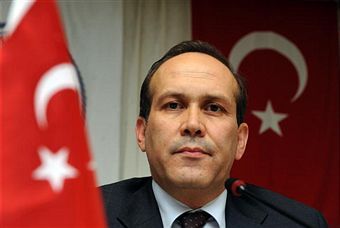 Earlier this year, Transatlantic Trends, an annual survey of public opinion on both sides of the Atlantic, was published. Key highlights from the survey included a quadrupling of European support for President Obama’s handling of foreign policy. But what really caught my eye was how badly the relationship between the West and Turkey had frayed. 65 percent of Turks do not think it is likely their country will join the EU. Nearly half of Turks polled think Turkey is not really part of the West, while 43 percent think Turkey should not partner with the EU, the US or Russia in solving global problems.
Earlier this year, Transatlantic Trends, an annual survey of public opinion on both sides of the Atlantic, was published. Key highlights from the survey included a quadrupling of European support for President Obama’s handling of foreign policy. But what really caught my eye was how badly the relationship between the West and Turkey had frayed. 65 percent of Turks do not think it is likely their country will join the EU. Nearly half of Turks polled think Turkey is not really part of the West, while 43 percent think Turkey should not partner with the EU, the US or Russia in solving global problems.
The break-down of the alliance between the West and Turkey – which has endured since the Truman administration, and contributed to the strength of NATO, the resistance to the Soviet Union and, latterly, to a number of Middle East peace initiatives – is bad news; not least because many commentators, like George Friedman of Stratfor, believe Turkey will become one of the most important global powers in coming years.
The recent conflict between the US and Turkey over what to call the killing of Armenians during World War II – which has seen Ankara recall it ambassador to DC in protest at a congressional resolution – is only the latest bone of contention. Turkey and the EU have for a while been locked in fruitless discussions about Turkey’s EU accession, an irresolvable proposition so long as French President Nicolas Sarkozy remains opposed.
Meanwhile, Turkey is moving away from its pro-Western orientation and Euro-Atlantic institutions. Under Foreign Minister Ahmet Davutoğlu’s guidance, Turkish foreign policy’s focus has shifted towards other regions, mostly the Middle East. As he told a Sarajevo audience last year: Turkey’s sphere of influence extends in a 3000 kilometers circle from the capital Ankara and takes in 72 countries.
Relations between Ankara and Moscow are at a particular high, which should worry Western policy-makers. Russia has been Turkey’s No. 1 trade partner since 2003. Hundreds of Turkish firms operate in Russia, and Russians are the most frequent visitors in Turkey, with more than 2 million each year. Russia also provides half of Turkey’s coal and 65 percent of its gas through the world’s longest undersea gas pipeline, Blue Stream.
The Turkish government still talks the talk of EU accession. Its line is that Turkey wants to wrap up EU accession talks by 2013, and celebrate the 100th anniversary of the Turkish republic in 2023 as an EU member state. But with increased opposition in Europe this aim looks ambitious.
If the strategic divorce between Turkey and West continues, the price paid by both sides will be steep. The West needs Turkey in dealing with Russia, Iran, Syria and Iraq, not to mention as a broker in the Middle East Peace Process. If Russia weakens, Turkey emerges as the dominant power in the region. Economically, too, Turkey will be important; it is now the world’s 17th-largest economy and its $60 billion public-procurement market will be important for European firms. Its military is the most capable in the region and is also probably the strongest in the European vicinity, apart from the British armed forces.
In the late 1940s, the question asked in the US foreign policy community was ‘Who Lost China?’. If we are not careful, it will be Turkey which is lost to the West. To help avoid this, whoever wins the forthcoming general election here should make improving strategic ties between Britain and Turkey a foreign policy priority.






Comments